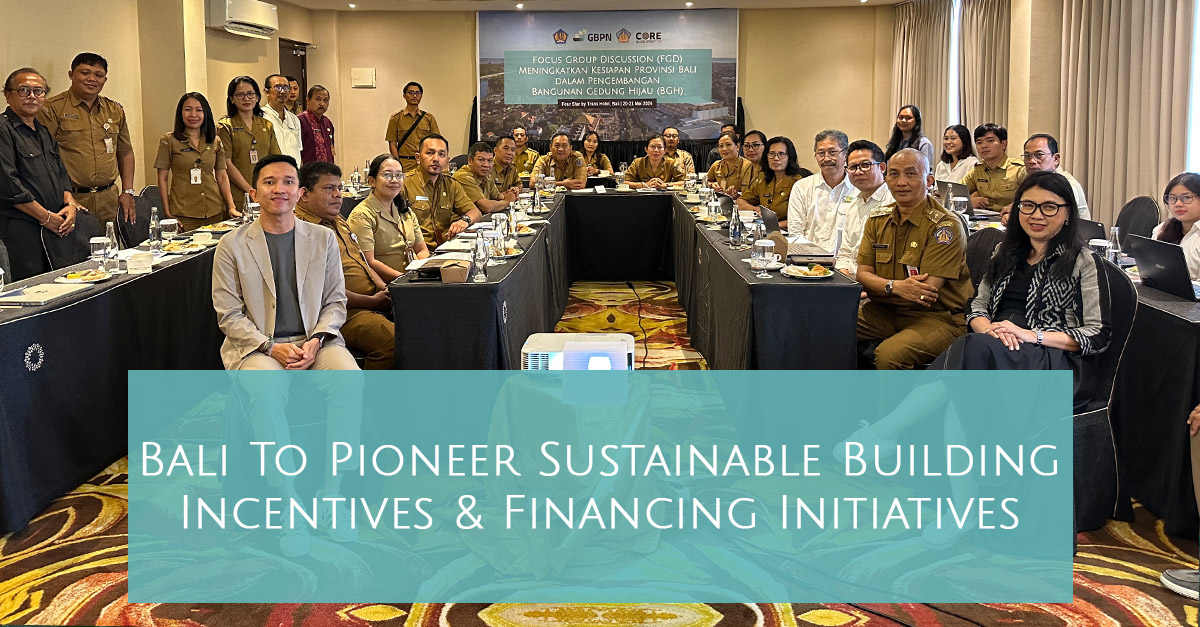Key policymakers and stakeholders have gathered for the first time to discuss green building opportunities that can be piloted in Bali Province, Indonesia. The event in May was attended by officials from the Bali Provincial Agency of Manpower & Energy and Mineral Resources. They discussed incentives and financing options which, if successfully implemented, will accelerate Bali’s journey to achieve its net zero emission target by 20451.
This activity builds on initial work done by GBPN and the Ministry of Finance’s Fiscal Policy Agency (FPA). GBPN is now collaborating closely with Udayana University’s Center of Excellence Community Based Renewable Energy (CORE) to deliver the next phase, including assessing the most feasible options for Bali to implement financing and incentive options.
 Crucial feedback was gathered through surveys, and key Bali policymakers and stakeholders then consulted in Focus Group Discussions (FGDs) held in Denpasar to contextualise their recommendations.
Crucial feedback was gathered through surveys, and key Bali policymakers and stakeholders then consulted in Focus Group Discussions (FGDs) held in Denpasar to contextualise their recommendations.
The project is working closely with the Bali Provincial Government, particularly the Provincial Agency of Manpower & Energy and Mineral Resources, represented by the Head of the Agency, Ir. Ida Bagus Setiawan, to ensure relevant key public and private stakeholders are well-engaged, share a common understanding on the importance of green building and endorse the recommended options.
“This research on incentives to support green building implementation is timely and complementary to our existing efforts.” Mr. Setiawan said
We have just concluded our work with the GBPN on designing technical guidance for green building implementation to support the Governor Decree No. 45/2019 on Bali Clean Energy, sustainable access to financing will help bolster our efforts for successful implementation.”
GBPN’s Fiscal Policy Expert, Dr. Poppy Ismalina, explained that incentives and attractive financing mechanisms are essential to increase market uptake in green building.
market uptake in green building.
“In this continuation phase, we will continue to delve deeper by assessing the readiness of the Bali Province, both in the terms of economic viability and technical capacity to adopt fiscal incentives and carry out sustainable implementation of green buildings,” Dr. Ismalina said.
 Fararatri Widyadari, GBPN Senior Manager, highlighted the importance of national and sub national green building policies through collaborative efforts and are implementable nationwide.
Fararatri Widyadari, GBPN Senior Manager, highlighted the importance of national and sub national green building policies through collaborative efforts and are implementable nationwide.
“Collaboration is key. We are excited to see the outcome of this assessment. Our aim is not only to come up with policy recommendations, but also to assess its viability for implementation. Our hope is to have the results not only applicable in Bali, but also replicable in other subnational regions in Indonesia.”
_________
1In the Bali Clean Energy Plan
Share This Story, Choose Your Platform!
Stay in touch with how we’re transforming the buildings sector
GBPN runs innovative building policy reform programs in key regions around the world that aim to tackle the climate emergency by decarbonising the buildings sector. Stay up to date with our newsletter.
Stay in touch with how we’re transforming the buildings sector
GBPN runs innovative building policy reform programs in key regions around the world that aim to tackle the climate emergency by decarbonising the buildings sector. Stay up to date with our newsletter.



